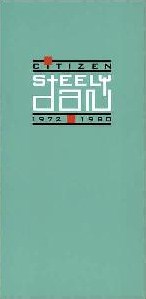- Wayne Andre – trombone
- Jerome Aniton – speech/speaker/speaking part
- Patti Austin – vocals (background)
- Jeff Baxter – guitar, pedal steel, Spanish guitar
- Walter Becker – bass, guitar, harmonica, trumpet, bass (electric), flugelhorn, keyboards, vocals
- Joe Bellamy – assistant engineer
- Ben Benay – guitar (acoustic)
- Crusher Bennett – percussion
- Randy Brecker – trumpet, flugelhorn
- Ray Brown – bass (upright)
- Hiram Bullock – guitar
- Ed Caraeff – photography
- Larry Carlton – guitar
- Geary Chansley – research
- Pete Christlieb – flute, saxophone
- Gary Coleman – percussion
- Ronnie Cuber – sax (baritone)
- Rick Derringer – guitar, slide guitar
- Denny Dias – guitar, sitar (electric)
- Henry Diltz – photography
- Donald Fagen – organ, synthesizer, piano, piano (electric), vocals, vocals (background)
- Wilton Felder – bass
- Victor Feldman – percussion, marimba, vibraphone
- Michael Fennelly – vocals (background)
- Venetta Fields – vocals (background)
- Bob Findley – horn
- Chuck Findley – arranger, horn, brass
- Frank Floyd – vocals (background)
- Steve Gadd – drums
- Jerry Garszza – overdubs
- Gordon Grady – vocals (background)
- Diva Gray – vocals (background)
- Jay Graydon – guitar
- Ed Greene – drums
- Tom Greto – assistant engineer
- Paul Griffin – arranger, keyboards, piano (electric), vocals (background)
- Don Grolnick – arranger, keyboards, clavinet
- Lani Groves – vocals (background)
- Patricia Hall – vocals (background)
- Jimmie Haskell – arranger, orchestration
- Jim Hodder – percussion, drums, vocals
- Jim Horn – flute, saxophone
- Paul Humphrey – drums
- Slyde Hyde – horn, brass
- Barbara Isaak – assistant engineer
- Anthony Jackson – bass
- Plas Johnson – flute, horn, saxophone
- Royce Jones – percussion, vocals, vocals (background)
- Walter Kane – clarinet (bass)
- Howard Kaylan – vocals (background)
- Jackie Kelso – flute, saxophone
- Jim Keltner – percussion, drums
- Randall Kennedy – photography
- Steve Khan – guitar
| - Clydie King – vocals (background)
- John Klemmer – horn
- Ken Klinger – assistant engineer
- Mark Knopfler – guitar
- Rebecca Louis – vocals (background)
- Johnny Mandel – arranger
- George Marge – clarinet (bass)
- Rick Marotta – drums
- Nicky Marrero – timbales
- Sherlie Mathews – vocals (background)
- Myrna Matthews – vocals (background)
- Lew McCreary – brass
- Michael McDonald – keyboards, vocals, vocals (background)
- Andy McKaie – coordination
- Leslie Miller – vocals (background)
- Jeff Mironov – guitar
- Lanny Morgan – saxophone
- Rob Mounsey – synthesizer, arranger
- Roger Nichols – sound effects, engineer, overdubs, executive engineer
- Michael Omartian – piano
- David Palmer – vocals, vocals (background)
- Ron Pangaliman – assistant engineer
- Dean Parks – guitar
- Barney Perkins – mixing
- Bill Perkins – saxophone
- Jeff Porcaro – drums
- Bernard "Pretty" Purdie – drums
- Ed Rack – assistant engineer
- Chuck Rainey – bass
- Elliott Randall – guitar
- Pat Rebillot – piano (electric)
- Jerome Richardson – sax (tenor)
- Lee Ritenour – guitar
- James Rolleston – vocals (background)
- John Rotella – saxophone
- Joe Sample – clarinet, piano (electric)
- David Sanborn – sax (alto)
- Zachary Sanders – vocals (background)
- Elliot Scheiner – engineer
- Timothy B. Schmit – vocals (background)
- Al Schmitt – engineer
- Bill Schnee – engineer
- Tom Scott – clarinet, flute, arranger, conductor, sax (alto), sax (tenor), Lyricon
- Wayne Shorter – flute, saxophone
- Valerie Simpson – vocals (background)
- Steely Dan – arranger
- Casey Syszik – vocals (background)
- Linda Tyler – assistant engineer
- Vartan – creative director
- Mark Volman – vocals (background)
- Florence Warner – vocals (background)
- Ernie Watts – saxophone
- Tim Weston – assistant engineer
- Toni Wine – vocals (background)
- Snooky Young – flugelhorn
|
